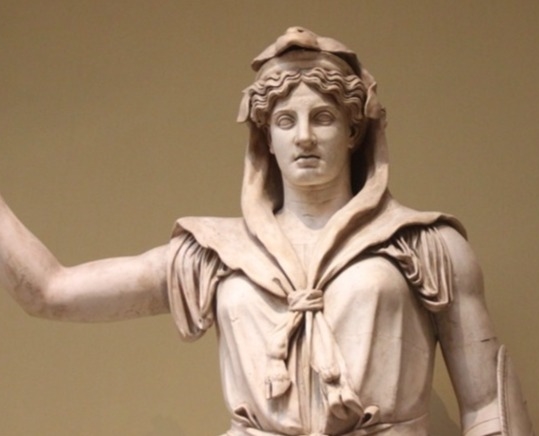Juno

Queen of the Gods
Background
It is said that behind every great man stands a woman, and this rings true for deities as well. For Jupiter, this is Juno; his sister and wife. Juno is the Queen of the Gods, as well as the Goddess of Childbirth, Marriage, and Womanhood.
History
There is a great deal of uncertainty in the history of Juno's worship. Numerous epithets designating a variety of seemingly incongruous roles have been granted to her. And tenuous links to a multitude of other gods have muddied any explicit early roles and mythology. Regardless, her worship is ancient and well-attested among the Ancient Romans. General acceptance has her name related to the Latin word 'iuvenis', meaning 'youth', implying a link to cults and rites associated with young women.
Longstanding contact with Hellenistic peoples led to the Grecian Pantheon becoming intertwined with the Roman. And Juno came to be seen as the counterpart of the Greek Hera, sister-wife of Zeus.
Mythology & Legends
Despite the significance of Juno in the Roman world, the goddess initially opposed the Roman people. The ancestors of the Romans, the inhabitants of Troy, had vexed her after a Trojan Prince named Paris judged her less beautiful than the goddess Venus. This led to her aiding the Greek invaders in the decade-long Trojan War. Even after Troy was in ruins, Juno sought vengeance on the surviving Trojans of the Dardan tribe. Her reasoning was twofold; her most beloved civilization, Carthage, was destined to be destroyed by the Roman people.
In time, however, through reverence and piety, Juno grew to accept the Roman people, becoming revered by them as one of the most glorious of deities of their pantheon. Shrines and cults dedicated to her glory dotted Italy and beyond, and innumerable women would come to invoke her in both marriage and childbirth.
In Ancient Rome
If Venus is the embodiment of sexual womanhood, Juno is the embodiment of civic womanhood. Her association with both uxorial and stately functions made her popular with women of every class throughout Roman history.
With Minerva and Jupiter, she makes up a third of the Capitoline Triad, an archaic grouping of deities with significance obscured even to the Ancient Romans. Though the Triad waned in importance over the centuries, iconography of the trio endured. Temples dedicated to the trio are known to have existed, including an extent set of temples in Pompeii.